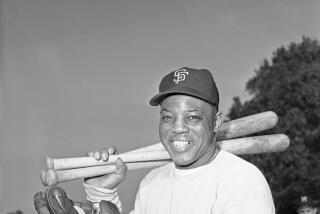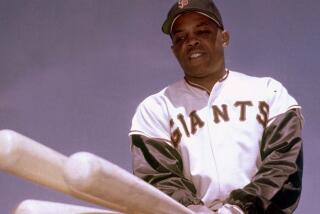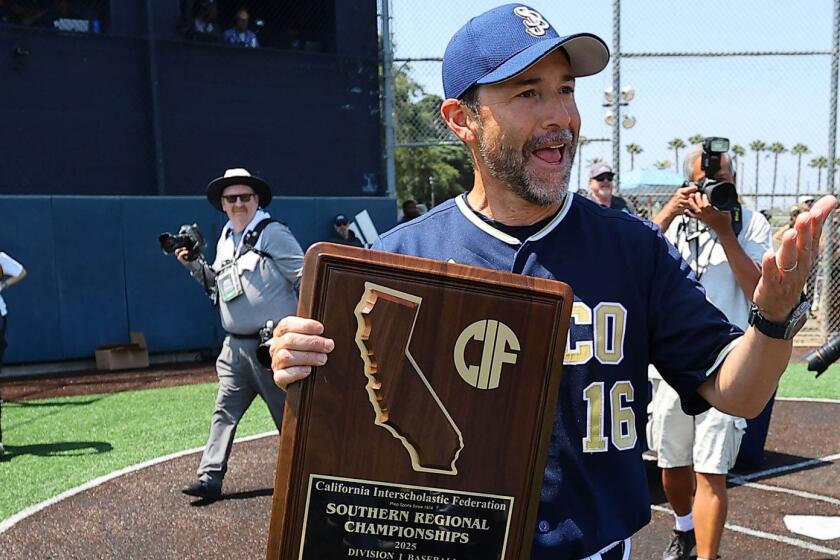Williams Returns to Teach New Cubs How to Hit Ball
- Share via
CHICAGO — Older Cubs fans remember. Before there was a Ryne Sandberg lining drives in the Wrigley Field alleys, or a Leon Durham lofting homers into the right field bleachers, there was Billy Williams.
Williams, a pure hitter who always seemed to toil in obscurity, was appreciated by a generation of fans who were around before the “new tradition” Cubs of Dallas Green laid claim to being “America’s team.”
His statistics were Hall of Fame caliber, although the former Cubs’ outfielder has yet to win the required number of votes for admission to Cooperstown.
Williams is back as the Cubs’ hitting instructor this season. It is only fitting he is in a situation where he knows two things so well--hitting and the Cubs.
“Well, any time you stay with an organization for 14 years and get used to wearing the (Cubs) blue, and being that Chicago is my home, it’s a great thrill, really a thrill, to be back in a Cubs’ uniform,” Williams says.
Williams strayed from the “friendly confines” for a while. He was traded by the Cubs to Oakland in 1974 for pitchers Darold Knowles and Bob Locker and infielder Manny Trillo, who now is back with the club and taking hitting instruction from Williams. He returned to the Cubs as a coach for a five-year term beginning in 1978 and then served as the A’s hitting instructor from 1983 through last season.
But he never stopped being a Cub fan.
“I followed the Cubs all the time. I used to go to a bar named ‘Ricky’s’ near my home and watched the club on cable. And people in the stands, even when I was with the A’s, never let me forget my Cubs’ past,” Williams says. “Particularly, the 1969 club with Ernie Banks, myself and Ron Santo.
“I went places and saw the Cub logo. It did make me homesick.”
Williams has his own theories as to why the Cubs have always had such a magic appeal that lures ex-players and fans to a love of this franchise.
“Human nature says let’s go with the underdogs. I think it goes back to 1945 and never having won a pennant since then,” Williams says. “All of these die-hard Cub fans came out of the woodwork in 1984 when they won.
“That year, when I was with Oakland I went to speak outside of Oakland and someone came up to me, started crying, saying he wish his dad could have seen me play on a winner.”
Similar incidents occurred outside of the United States.
“About three or four years ago, myself and Henry Aaron took some minor league ballplayers and went to Korea and stayed there 18 days,” Williams recalls. “The people in Korea would come out and talk about the Cubs. The Cubs every day. Everywhere you go, Cubs. They want to know this and that about the Cubs. It was amazing.”
If the Cubs are so popular, why haven’t Williams’ accomplishments received wider notice among Hall of Fame voters?
He hit 20 or more homers 13 straight seasons and drove in 90 or more runs in 10 of 11 seasons from 1962 and 1972. He also set the National League record (since broken by Steve Garvey) of most consecutive games played (1,117) between 1962 and 1970.
Williams has taken the attitude that is so familiar for the Cubs’ faithful--wait until next year.
“Well, I’m certainly hoping that next year is the year and I know I’ve said that for the last five years,” he says. “I thought I was real close last year, but from what I’ve heard and observed, next year should be the year.”
Williams’ omission has drawn editorial support from the Midwest but whether that carries over to the rest of the country remains a question for the 47-year-old Williams.
“This all may be a blessing in disguise. I’m looking at things positively. With me not going into the Hall this summer should make everyone more aware of what I have done,” Williams says.
Why is getting into the Hall so important to Williams? He insists it isn’t an ego trip or for monetary rewards.
“Well, I think in all the major sports it means something. But in baseball, we don’t put too many players in there and it’s very selective,” Williams says.
More to Read
Go beyond the scoreboard
Get the latest on L.A.'s teams in the daily Sports Report newsletter.
You may occasionally receive promotional content from the Los Angeles Times.










